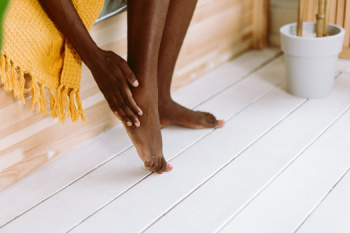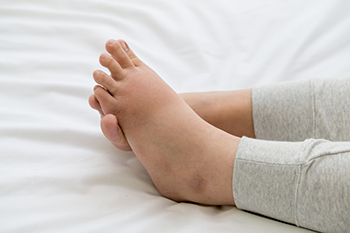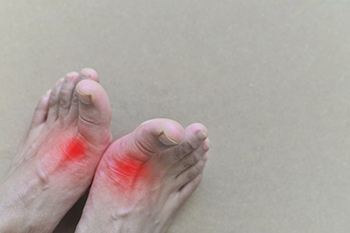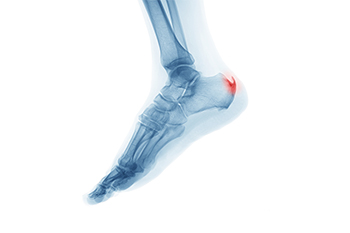Items filtered by date: January 2025
Causes of Sudden Ankle Pain Without Injury

Sudden ankle pain without a clear injury can be caused by several underlying conditions. Gout is one of the most common causes, characterized by sudden, intense pain, often in the joint of the big toe, but it can also affect the ankle. This condition occurs when uric acid builds up in the body, forming crystals that cause inflammation and pain. Arthritis, particularly osteoarthritis or rheumatoid arthritis, can also lead to sudden ankle pain, as the joint becomes inflamed and worn down over time. Achilles tendinitis is another potential cause, resulting in pain and swelling in the tendon at the back of the ankle. This condition is often triggered by overuse or strain, even without a specific injury. Flat feet can also contribute to sudden ankle pain by placing additional stress on the joints, leading to discomfort and inflammation. If your ankle hurts without an obvious reason, it is suggested that you contact a podiatrist who can determine what the reason is, and offer appropriate treatment solutions.
Ankle pain can be caused by a number of problems and may be potentially serious. If you have ankle pain, consult with Joseph M. LaCava, DPM from Arkansas. Our doctor will assess your condition and provide you with quality foot and ankle treatment.
Ankle pain is any condition that causes pain in the ankle. Due to the fact that the ankle consists of tendons, muscles, bones, and ligaments, ankle pain can come from a number of different conditions.
Causes
The most common causes of ankle pain include:
- Types of arthritis (rheumatoid, osteoarthritis, and gout)
- Ankle sprains
- Broken ankles
- Achilles tendonitis
- Achilles tendon rupture
- Stress fractures
- Bursitis
- Tarsal tunnel syndrome
- Plantar fasciitis
Symptoms
Symptoms of ankle injury vary based upon the condition. Pain may include general pain and discomfort, swelling, aching, redness, bruising, burning or stabbing sensations, and/or loss of sensation.
Diagnosis
Due to the wide variety of potential causes of ankle pain, podiatrists will utilize a number of different methods to properly diagnose ankle pain. This can include asking for personal and family medical histories and of any recent injuries. Further diagnosis may include sensation tests, a physical examination, and potentially x-rays or other imaging tests.
Treatment
Just as the range of causes varies widely, so do treatments. Some more common treatments are rest, ice packs, keeping pressure off the foot, orthotics and braces, medication for inflammation and pain, and surgery.
If you have any questions please feel free to contact our office located in Hot Springs, AR . We offer the newest diagnostic tools and technology to treat your foot and ankle needs.
Causes of Swollen Ankles and Feet

Swollen ankles can result from a variety of conditions affecting the feet, toes, and ankles, ranging from minor injuries to serious medical issues. The most common causes of swollen ankles include trauma such as sprains, fractures, or torn tendons, which often result in localized swelling. Overuse injuries like tendonitis or bursitis may also cause gradual swelling. Infections, including those stemming from ingrown toenails or severe athlete's foot, can lead to swelling accompanied by redness and pain. Systemic conditions, such as arthritis, gout, or autoimmune diseases, may contribute to foot or ankle swelling, while also causing stiffness or inflammation. Venous insufficiency or blood clots in the legs can impair blood flow and lead to fluid buildup in the feet and ankles. Lymphedema, caused by blocked lymphatic flow, is another potential factor. A podiatrist can diagnose the underlying cause of foot or ankle swelling through a detailed examination, recommend appropriate treatment options, and help prevent further complications. If you have a swollen ankle, it is suggested that you schedule an appointment with a podiatrist.
Swollen feet can be a sign of an underlying condition. If you have any concerns, contact Joseph M. LaCava, DPM of Arkansas. Our doctor can provide the care you need to keep you pain-free and on your feet.
Swollen feet are a common ailment among pregnant women and people who stand or sit for extended periods. Aging may increase the possibility of swollen feet and patients who are obese often notice when their feet are swelling too. There may be medical reasons why swollen feet occur:
- Phlebitis - A condition that causes the veins to become inflamed and can also cause leg pain.
- Liver disease - This may lead to low blood levels of albumin which is a protein. This can cause fluid in the blood to pass into the tissues and several areas of the body can become swollen.
- Heart failure - When the heart doesn’t pump properly the blood that is normally pumped back to the heart can pool in the veins of the legs causing swollen feet.
- Kidney disease - One of the main functions of the kidneys is releasing excess fluid in the body. This type of condition can make it difficult for the kidneys to function properly, and as a result the feet may become swollen.
- Deep-vein thrombosis (DVT)- This is a serious condition where blood clots form in the veins of the legs. They can block the return of blood from the legs to the heart which may cause the feet to swell. It is important to be treated by a podiatrist if this condition is present.
Swollen feet can also be caused by bone and tendon conditions, including fractures, arthritis, and tendinitis. Additionally, there may be skin and toenail conditions and an infection may cause the feet to swell. Patients who take medicine to treat high blood pressure may be prone to getting swollen feet.
Many patients elevate their feet to help relieve the swelling and this is generally a temporary remedy. When a podiatrist is consulted the reason behind the swelling can be uncovered and subsequently treated.
If you have any questions please contact our office located in Hot Springs, AR . We offer the newest diagnostic and treatment technologies for all your foot and ankle needs.
Custom Orthotics For Teen Athletes

Parents, support your athletic teens with Custom Orthotics! As they excel in sports and activities, their feet need optimal care. Custom Orthotics provide the right alignment, reducing fatigue and enhancing performance. They help absorb shocks, minimize injuries, and cater to their unique foot structure. Don't let foot discomfort sideline their passion. Invest in their comfort and athletic future by choosing Custom Orthotics from our office. Call today for an appointment.
Symptoms and Triggers of Gout Attacks

Gout is a painful form of arthritis caused by a buildup of uric acid in the blood, leading to the formation of sharp crystals in joints. This condition often affects the feet, toes, and ankles, with the big toe being a common site for painful gout flare-ups. Symptoms include intense pain, swelling, redness, and warmth in the affected joints, which often occur at night and disrupt sleep. Flare-ups tend to occur suddenly and may last for days or weeks, followed by periods without symptoms. Risk factors for gout include obesity, kidney disease, and diabetes. Dietary triggers like alcohol and purine-rich foods, especially red meat or certain seafoods, are other factors. A podiatrist can diagnose gout through imaging or fluid analysis and provide treatment to manage symptoms, reduce inflammation, and prevent future flare-ups. If you are experiencing painful gout symptoms, it is suggested that you schedule an appointment with a podiatrist for treatment options.
Gout is a foot condition that requires certain treatment and care. If you are seeking treatment, contact Joseph M. LaCava, DPM from Arkansas. Our doctor will treat your foot and ankle needs.
What Is Gout?
Gout is a type of arthritis caused by a buildup of uric acid in the bloodstream. It often develops in the foot, especially the big toe area, although it can manifest in other parts of the body as well. Gout can make walking and standing very painful and is especially common in diabetics and the obese.
People typically get gout because of a poor diet. Genetic predisposition is also a factor. The children of parents who have had gout frequently have a chance of developing it themselves.
Gout can easily be identified by redness and inflammation of the big toe and the surrounding areas of the foot. Other symptoms include extreme fatigue, joint pain, and running high fevers. Sometimes corticosteroid drugs can be prescribed to treat gout, but the best way to combat this disease is to get more exercise and eat a better diet.
If you have any questions, please feel free to contact our office located in Hot Springs, AR . We offer the newest diagnostic and treatment technologies for all your foot care needs.
Plantar Warts Can Be Treated!
How Foot Orthotics Enhance Comfort and Speed While Running

Foot orthotics are a valuable tool for runners seeking to improve comfort and speed, and reduce the risk of injury. Custom-made orthotics provide personalized support to the feet, improving alignment and stabilizing the foot during each stride. This helps to evenly distribute pressure across the foot, reducing the strain on muscles and joints. By correcting abnormalities such as overpronation, orthotics help runners maintain a more efficient gait, leading to improved speed and better endurance. With proper support, runners are less likely to experience injuries like shin splints, plantar fasciitis, or stress fractures. Orthotics also provide cushioning, which helps to absorb shock and enhances overall comfort during long runs. By addressing specific foot issues, orthotics can improve performance while minimizing discomfort and injury risk. If you're experiencing foot pain while running, it is suggested that you contact a podiatrist who can discuss the benefits of custom-made orthotics with you.
Custom orthotics are specialized shoe inserts created to support and align the feet according to each person’s unique structure and walking pattern. They are an effective way to relieve foot discomfort caused by conditions such as flat feet, high arches, plantar fasciitis, bunions, and heel pain. When the natural alignment of the foot is off balance, it can lead to pressure points, strain, and pain that affect how a person stands, walks, and moves. Orthotics work by redistributing weight evenly and supporting the arch to reduce stress on the muscles, tendons, and joints of the feet and lower legs.
Foot discomfort can develop for many reasons, including wearing improper footwear, long hours of standing, repetitive motion, or underlying structural problems. Over time, this discomfort can extend beyond the feet, contributing to knee, hip, or lower back pain. Custom orthotics help correct these issues by improving alignment and promoting more efficient movement. They are made using precise measurements and imaging to ensure the best fit for each patient, providing targeted support and cushioning where it is needed most.
Unlike generic insoles, custom orthotics are durable, medically designed, and tailored to your specific needs. Whether you are managing chronic pain, recovering from an injury, or simply seeking better comfort and stability, orthotics can make a noticeable difference in how your feet feel throughout the day.
If you are experiencing persistent foot discomfort or fatigue, it may be time to have your feet evaluated by a podiatrist. Call our office today for more information or to schedule an appointment.
If you have any questions, please feel free to contact our office located in Hot Springs, AR .
Heel Spurs and Their Causes

A plantar calcaneal spur, commonly known as a heel spur, is a bony growth that forms on the underside of the heel bone. A heel spur typically develops as a result of repetitive stress and strain on the foot, often linked to activities that involve high-impact movements like running or jumping. Prolonged standing, obesity, poor footwear, or abnormalities in foot structure such as flat feet or high arches can also lead to heel spurs. Over time, this pressure can cause the tissues on the bottom of the foot, particularly the plantar fascia, to pull away from the heel bone. This strain triggers bone formation as the body attempts to repair the area, leading to the growth of a spur. While the spur itself may not always cause pain, it can irritate surrounding tissues, resulting in discomfort or inflammation. If you have a heel spur, it is strongly suggested that you promptly contact a podiatrist.
Heel spurs can be incredibly painful and sometimes may make you unable to participate in physical activities. To get medical care for your heel spurs, contact Joseph M. LaCava, DPM from Arkansas. Our doctor will do everything possible to treat your condition.
Heels Spurs
Heel spurs are formed by calcium deposits on the back of the foot where the heel is. This can also be caused by small fragments of bone breaking off one section of the foot, attaching onto the back of the foot. Heel spurs can also be bone growth on the back of the foot and may grow in the direction of the arch of the foot.
Older individuals usually suffer from heel spurs and pain sometimes intensifies with age. One of the main condition's spurs are related to is plantar fasciitis.
Pain
The pain associated with spurs is often because of weight placed on the feet. When someone is walking, their entire weight is concentrated on the feet. Bone spurs then have the tendency to affect other bones and tissues around the foot. As the pain continues, the feet will become tender and sensitive over time.
Treatments
There are many ways to treat heel spurs. If one is suffering from heel spurs in conjunction with pain, there are several methods for healing. Medication, surgery, and herbal care are some options.
If you have any questions, please feel free to contact our office located in Hot Springs, AR . We offer the newest diagnostic and treatment technologies for all your foot care needs.

